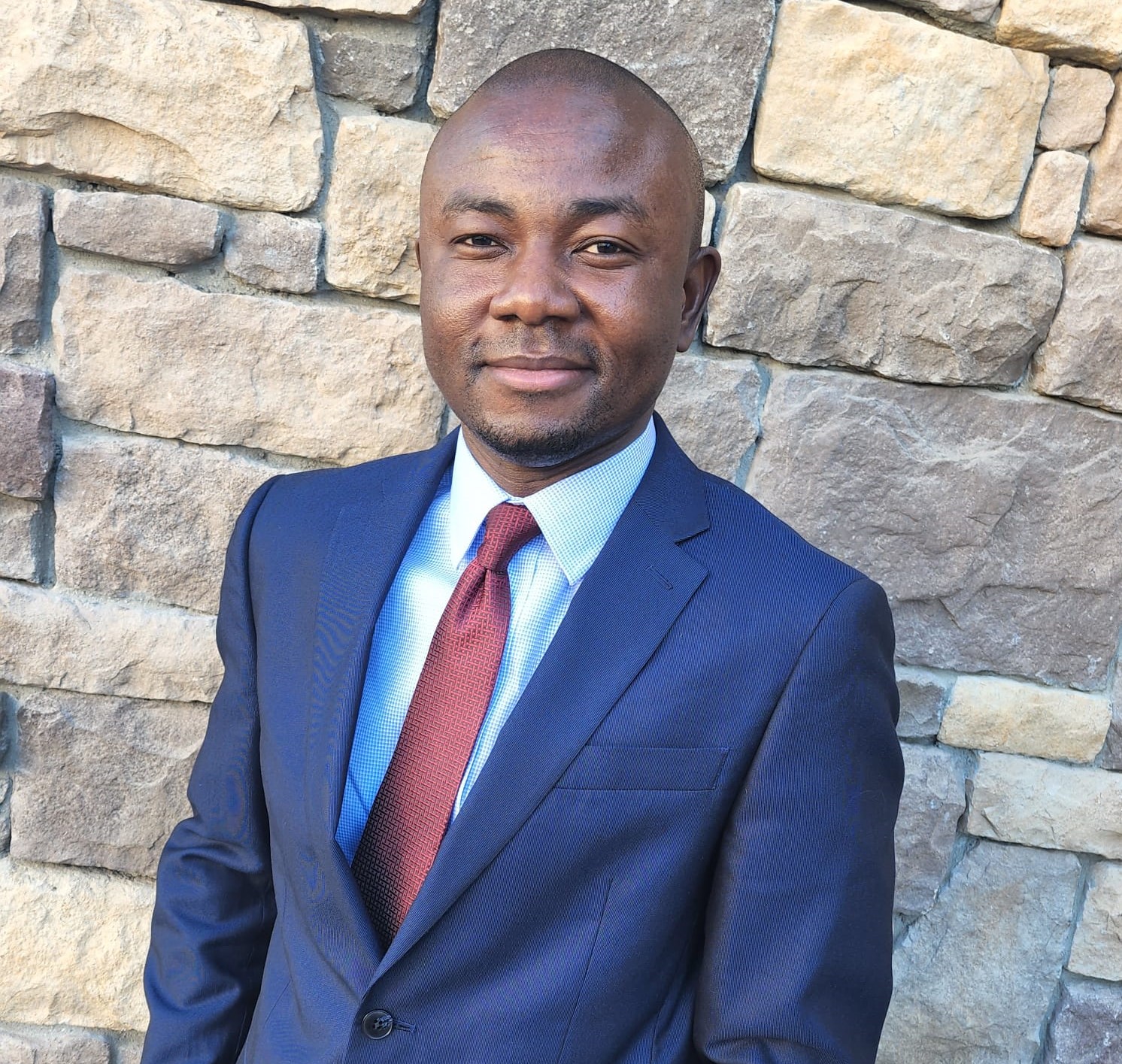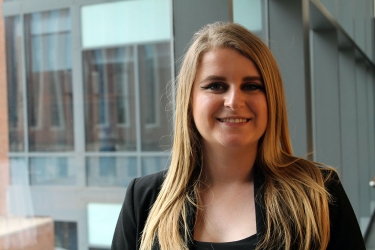Ayodeji “Ayo” Oluwalana, Waste Reduction and Recycling Program Manager
At the heart of Penn State’s commitment to sustainability lies the topic of waste management. In our recent interview with Ayodeji “Ayo” Oluwalana, the University’s Waste Reduction and Recycling Program Manager, Ayo shared insights into his journey, expertise, and vision for advancing eco-friendly initiatives on campus.
Stepping into the role as the inaugural Waste Reduction and Recycling Program Manager, Ayo brings a robust background in environmental management, underscoring his dedication to shaping a greener future here at Penn State and globally. Throughout our conversation, Ayo highlighted key experiences, such as coping with the effects of waste-related floods in his home community, showcasing his deep personal understanding of the critical intersections between sustainability, waste reduction, and community engagement.
This snapshot interview provides a glimpse into Ayo Oluwalana’s strategies for fostering a culture of sustainability at Penn State, shedding light on the innovative approaches he plans to implement in the University’s recycling programs. Join us as we unravel the dynamic and inspiring journey of Ayo Oluwalana, a pivotal figure in propelling Penn State toward a more sustainable and environmentally conscious future.
Tell us a little about your position as Waste Reduction and Recycling Program Manager. What are some of the primary responsibilities?
My position is responsible for the overall management of waste reduction and recycling initiatives at University Park but also provides support to the commonwealth campuses as needed.
Some of my primary responsibilities include:
- Providing direction and guidance to operational and academic units to implement strategies, educational and outreach initiatives, and programs to reduce waste and increase recycling activities on campus, furthering Penn State’s sustainability goals.
- Collaborating with key internal and external stakeholders to develop, implement, and improve waste reduction and recycling programs.
- Collaborating with the Office of Physical Plant leadership, the Sustainable Operations Council, and Penn State Sustainability to establish annual goals for waste reduction and recycling efforts.
- Developing and implementing methods to measure the success of reduction and recycling efforts at both the building and departmental levels and providing feedback to customers to improve waste reduction and recycling efforts.
- Developing and conducting ongoing waste reduction and recycling educational campaigns for faculty, staff, students, and visitors.
- Collaborating extensively with Procurement Services to reduce waste and increase recycling by implementing and promoting sustainable procurement strategies/policies.
You previously filled similar roles with Iowa State and Western Colorado University. Were there any aspects of your personal background that inspired you to focus your professional aspirations around the topic?
Working in waste management and sustainability is not just a career for me; it is very personal. Why? Because my family was impacted by massive floods in 2012 due to poor waste management systems in my home country which resulted in the loss of properties and family friends. When it happened, I was a university administrator (Assistant Registrar) with a bachelor’s degree in environmental management. That singular incident altered my career trajectory and shaped my resolution to dedicate my life to promoting sustainable waste management best practices.
Before I came to the United States, I had thought the issue of waste was a problem that primarily affected the African continent, but I soon discovered that it’s a truly global challenge.
How would you describe the importance of sustainability to you personally, and how does that translate into your work? What inspires you to continue working toward a more sustainable future?
Sustainability is very personal and important to me simply because I see it as a lifestyle everyone should embrace. Sustainability considers the long-term well-being of our planet, its ecosystems, and every living entity. It encompasses environmental, social, and economic dimensions, aiming to meet the needs of the present without compromising the ability of future generations to meet their own needs.
Sustainability is at the center of my work, as it puts into perspective the impacts of our actions and their implications for the future. For example, how do our actions today, with waste generation, impact future generations’ ability to survive in the context of resource depletion? Additionally, the increasing urgency of global challenges like climate change, to which waste contributes significantly, and alarming biodiversity loss is a powerful motivator for me to continue advancing actions and advocating for sustainable solutions.
The impact climate change has had on my life and family has inspired me daily to push for a sustainable future and world. I want people to know that our daily actions have consequences, and such impacts are felt more by vulnerable communities, cities, countries, etc. I also want to leave a legacy for my children so they can continue to carry on my work. For example, my kids are aware of my story (the 2012 flood story), which has inspired them to take an interest in recycling and become actively involved in our waste management at home. One of them plans on starting a recycling club in his elementary school next academic year, which brings fulfillment to me.
United Nations Sustainable Development Goal 6 is to “ensure availability and sustainable management of water and sanitation for all.” The UN cites that 3.5 billion globally lack access to safely managed sanitation. What communities of people does that challenge primarily affect? Is that concern manifesting in our community in any way?
First, we must understand that access to water and sanitation is an equity issue, and no one should be left behind. Unfortunately, the most impacted communities are communities of color, low-income people in rural areas, and tribal communities. I’m not aware if this is a concern within our community, but that is not to say it does not exist.
How does your position contribute to the University’s commitment to the Sustainable Development Goals?
My position as the Waste Reduction and Recycling Program Manager is critical to advancing the University’s commitment to attaining the United Nations Sustainable Development Goals. For example, Sustainable Development Goal 12 is focused on “sustainable consumption and production,” and my position helps highlight our consumption and production pattern as a University. My position provides direction and guidance to all operational and academic units to implement strategies, educational and outreach initiatives, and programs to help reduce waste generation, reuse materials as much as possible, and increase recycling participation on campus.
Another aspect of my position is to educate individuals to adopt more sustainable lifestyles: consume less (which might save them money), choose products with lower environmental impacts, and reduce the carbon footprint of day-to-day activities.
Food waste is a symptom of overconsumption, and my position works with a variety of stakeholders to ensure that we adequately tackle food loss, as informed by data, as well as investments in technologies, infrastructure, education, and monitoring. The Student Fee Board recently approved funding for the Organic Materials Processing and Education Center (OMPEC) – compost facility to upgrade the infrastructure, which will help divert food waste and organic products from the landfill.
The questions are, “What are we buying as a University? Are all departments and units across the Penn State system spending resources on sustainable products? How can we educate stakeholders and enforce policies guiding sustainable procurement and state laws that guide effective waste management?”
All these practices will help us continue to minimize waste and address resource depletion. A slogan I have that speaks to this is, “Don’t Buy What You Don’t Need.”
What significant challenges do you face in managing waste and recycling at Penn State, and how do you address them?
It’s simple – the number one challenge we’re confronted with is cross-contamination. People are putting waste materials in the wrong bins, which renders the entire stream as trash and diverts it to the landfill.
Another challenge is that departments and units at the University are working in silos – they’re not talking to each other when it comes to waste issues. Waste is a University-wide issue and needs collective efforts to be addressed systematically.
Continuous education and engagement are the most effective ways to address the issues highlighted above through collaborations, communication, social media platforms, etc.
Are there any perceptions (or misperceptions) about waste that limit people’s ability to connect waste management to sustainability? How much impact could proper waste management practices have on sustainability efforts overall?
Absolutely! There are often untrue misconceptions about waste in general. For example, most people don’t believe it’s worth recycling because there is this general assumption that it will end up in the landfill anyway, so why should they care? Many believe recycling is a hoax. Most people think that waste is just anything they throw away and never care about what happens to it. This perception was exacerbated and worsened in America in 2017 when China instituted the “National Sword” ban – banning the shipping of America’s waste and that of other countries from coming to China. This led to many municipalities, cities, and states stopping recycling because sending waste to the landfill was less expensive than recycling. As a result of the unpleasant situation we found ourselves in as a country, public trust in recycling and sustainability was lost, which many call “greenwashing.” China’s ban exposed America’s failure to invest in its recycling industry and infrastructure. It showed how we have relied on other countries to manage our waste for too long. We have been so comfortable with the linear economy model of the “take-make-discard” model for too long, making it difficult to change.
Promoting a circular economy, a peer-reviewed approach to proper waste management practices, encourages eliminating waste and pollution, circulating products and materials (at their highest value), and regenerating nature. To be clear, the circular economy model impacts every aspect of sustainability – economy, society, and environment and this should be our approach as a University as we strive to attain the Sustainable Development Goals.
Can you highlight any innovative or effective solutions the University has implemented under your leadership?
Since I started my position two years ago, there have been several initiatives that have been implemented, including:
- Signage Upgrades
- We updated the University Park trash and recycling Mobius signs last summer due to existing realities across the University Park campus. This is one key initiative developed to address the issue of cross-contamination and confusion about what is recyclable and what is not. In the coming months, we will rebrand away from the Mobius brand, including signage improvements and waste stream reduction.
- Development of Trash and Recycling Station Standard Document
- We developed trash and recycling station standards that will standardize all our stations across campus, addressing inconsistencies and tackling the issue of contamination.
- This document was designed as a guideline for creating a series of trash and recycling station types to meet the University’s safety, operational, and aesthetic needs.
- Working and strongly encouraging University project consultants to adopt the document during planning for recycling station locations and design early in their timeline to deliver building designs.
- Campus Race to Zero Waste Competition
- Campus Race to Zero Waste is an annual competition to help colleges and universities improve recycling and waste reduction efforts.
- After over ten years of absence from the competition, we resumed our participation last year to benchmark our efforts with other universities in the US and Canada.
- We participated in different categories but won the “Race to Zero Waste – One Building Challenge” Category.
- We ranked 2nd out of 27 schools under the total pounds of e-waste recycled category with 40,059 lbs. See 2023 results here.
- Beaver Stadium Waste Diversion
- During the 2022/23 football season, a collaboration among Intercollegiate Athletics (ICA), Penn State Sustainability, and Office of Physical Plant resulted in the development of a standard operating procedure to divert recyclables both inside stadium bowl, concourse levels, and stadium entrances leveraging the help of several campus and community volunteers. This was instituted because of the introduction of alcohol sales, which increased the generation of recyclables in and around the stadium.
- A waste dashboard for Beaver Stadium waste is currently being developed to track the amount of trash and recycling generated per game every season to track progress.
- Compost (OMPEC) Facility Upgrade
- Due to the push for more compostable products on campus to replace single-use items, an upgrade to the current compost facility, which couldn’t handle more compostable products apart from food waste, was needed.
- The total cost of the upgrade was estimated to be $ 3 million, but funds were limited. Collaborations with multiple stakeholders, including student organizations, led to securing a $2.3 million fund from the UP-Student Fee Board to match the funds to begin the upgrade. The upgrade is expected to be completed by the winter of 2026.
How do you measure the success of sustainability initiatives regarding waste reduction and recycling rates?
Measuring the success of sustainability initiatives, particularly in terms of waste reduction and recycling rates, involves several key metrics and indicators, which include:
- Waste Generation Rates: Monitoring the waste generated over time provides a baseline for assessing progress. Decreases in waste generation indicate successful waste reduction efforts. We have a dashboard to track this on the Penn State Sustainability website.
- Recycling Rates: This is a crucial metric for us. Tracking the percentage of waste diverted from landfills and sent for recycling or composting is vital. Increasing recycling rates demonstrate the effectiveness of recycling programs and the willingness of individuals to participate.
- Waste Audit Data: Regular waste audits can provide detailed insights into the composition of the waste stream, identifying opportunities for further waste reduction, recycling, or composting. We conduct building-specific waste audits each semester, but an external contractor conducted a University-wide waste audit, and you can see the results here.
- Cost Savings: With the University facing budget issues, assessing cost savings associated with waste reduction and recycling initiatives is very important and can indicate success. This may include reduced waste disposal fees, savings from reusing materials, or revenue generated from selling recyclable materials.
- Educational Outreach and Engagement: Monitoring levels of awareness, participation, and behavior change among students, faculty, and staff through surveys, workshops, or other educational initiatives can gauge the effectiveness of sustainability messaging and engagement strategies.
- Carbon Emissions Reduction: Quantifying the greenhouse gas emissions avoided through waste reduction and recycling, particularly methane emissions from landfills, can demonstrate environmental benefits and contribute to broader sustainability goals.
- Stakeholder Feedback: Gathering feedback from various stakeholders, including students, faculty, staff, and community members, can provide qualitative insights into the perceived effectiveness and impact of sustainability initiatives.
Another effective way we have been measuring success is through AASHE’s Sustainability Tracking, Assessment & Rating System (STARS), which compares actual performance with established benchmarks, helps evaluate progress, and identifies areas for improvement.
What are some examples of collaboration with other departments, student groups, and the broader Penn State community that you tap into to promote waste reduction and recycling?
Collaboration examples include:
- UP Student Fee Board
- Student Fee Board Funding for OMPEC Upgrade
- $2.3 million funding
- Athletics
- Monthly meetings with key players within ICA
- East Area Lockers and Multisport new waste station bins pilot to test the effectiveness of the new bins.
- Beaver Stadium
- Working with Tailgate Ambassadors – coordinated by Penn State Sustainability
- Inside Stadium (Mount Nittany, Suites, Concourse, Concession etc.)
- Inside Bowl – recycling/trash team (clubs, community members, etc.)
- Pouring Rights Contract Opportunities
- Housing
-
- Housing Technical Staff and Managers in the six residential communities (East, South, North, West, and White Course, both technical staff and managers) were interviewed to discuss the waste and recycling systems within the various residential buildings.
- We surveyed students in residence halls on challenges/barriers and feedback on how to improve recycling.
- Sustainable Lab Ambassadors Waste Audit – Green Labs Project
- We provide support to the ambassadors.
- We provide logistical support to lab managers.
- Procurement Department
- We established monthly meetings on sustainable procurement.
- We offer more involvement with RFPs for campuses when needed.
- There is potential funding for Smart Carpet Initiatives.
- Local Climate Action Program (LCAP)
- We shared Penn State’s plans for waste reduction and recycling initiatives.
- THON Sustainability and Operations Team
- We worked with the THON students to develop a waste reduction & diversion plan for THON, which was fully implemented in 2024 THON.
- Student/Faculty/Staff Collaborations
- We collaborate with departmental Green Teams.
- We collaborated with an Ecoreps project for the Campus Race to Zero Waste competition.
- We offer training for Building Facilities Coordinators.
- We host a guest lecture series that has served the following classes.
- MKTG 442 – Sustainable Behavior Change (Sustainability Marketing with a focus on Behavior Change)
- BE/BRS 392 – Leadership Skills for Biorenewable Systems
- SUS 200 – Foundations of Leadership in Sustainability
How do you engage and educate our campus community about the importance of sustainable waste practices?
I leverage different departmental and unit collaborations to achieve those goals. I give presentations and training to stakeholders across campus, either through guest lectures or staff meetings, etc. I also leverage social media, website updates, Penn State Today, Daily Collegian, etc.
You can follow us @psu_recycles on Instagram and Twitter for updates on the program.
What’s one thing you wish folks knew about waste management regarding their ability to live more sustainably?<
It is a known fact that waste is a part of our lives. The way you see waste determines how you approach it. People should always remember that the more waste you generate, the more expensive it becomes to manage. My usual slogan to people has always been, “Don’t Buy What You Don’t Need.” People don’t realize the economic value they get when they don’t create waste in the first place.
How do you envision the future of waste management and sustainability at Penn State?
The future is bright, especially with the upgrade of the compost facility. That will be a game changer when the upgrade is completed, as it will help us divert compostable products from the landfill across all our facilities and events.
I envision a campus where our identity is engrained in sustainability; that is, everything we do speaks to our commitment to sustainability. I envision everyone on campus embracing sustainability as a lifestyle, and it becomes a habit that reflects in our consumption habits, which in turn leads to less waste to manage.
What advice would you give individuals looking to make a positive impact by living more sustainably?
Making a positive impact on sustainability can be achieved through various actions, both big and small. Here are some pieces of advice for individuals looking to make a difference:
- Educate Yourself: We need to stay informed and understand the impact of our actions on the environment. We need to be familiar with environmental issues and sustainability practices around us.
- Reduce, Reuse, Recycle: As mentioned, minimize waste by reducing consumption, reusing items whenever possible, and recycling materials. Opt for products with minimal packaging and choose reusable alternatives over single-use items.
- Conserve Resources: Practice energy and water conservation in your daily life. Turn off lights and appliances when not in use, use energy-efficient appliances, and limit water usage by fixing leaks and taking shorter showers.
- Support Sustainable Products and Companies: One of the ways we can use our funds to make a sustainable change is by buying products and engaging services from companies that prioritize sustainability and environmental responsibility. Look for certifications such as Fair Trade, USDA Organic, Forest Stewardship Council (FSC), etc.
- Eat Sustainably: Incorporate more plant-based foods into your diet and reduce meat consumption, as livestock farming has a significant environmental impact. Support local farmers and choose sustainably sourced seafood.
- Use Alternative Transportation: Reduce your carbon footprint by walking, biking, carpooling, or using public transportation to campus whenever possible. Consider investing in an electric or hybrid vehicle if feasible.
- Vote and Advocate: Support policies and initiatives that promote local, national, and global sustainability. Vote for political candidates who prioritize environmental issues and advocate for sustainable practices in your community. Be interested in what’s going on legislatively at the national, state, and local levels. Volunteer to be on local government boards on sustainability. Engage your legislators on sustainability-related issues and bills.
- Engage and Educate Others: Share your knowledge and passion for sustainability with friends, family, and community members. Encourage others to join you in making positive changes for the environment.
Remember, even small actions can collectively make a significant impact in promoting sustainability and protecting the planet for future generations.





